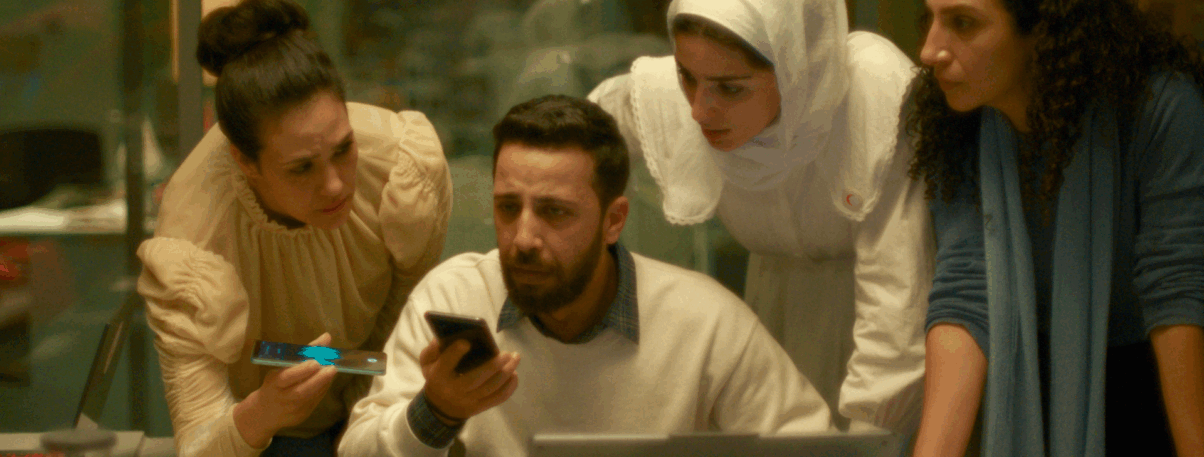Die Stimme von Hind Rajab
Kaouther Ben Hania | TN/FR 2025 | 89 minMit: Saja Kilani, Motaz Malhees, Clara Khoury
Kinostart: 30.1.2026

Der neue Film von Kaouther Ben Hania („Olfas Töchter“) war „der Film der Stunde“ (Der Standard) bei den Filmfestspielen von Venedig. THE VOICE OF HIND RAJAB wurde nach der Premiere mit rekordverdächtigen 23 Minuten Standing Ovations gefeiert und mit dem Großen Preis der Jury ausgezeichnet. Der Spielfilm, der auf echten Telefonaufzeichnungen eines realen Falls basiert, wurde für den Golden Globe 2026 nominiert und gilt als großer Oscar-Favorit.
Jänner 2024. Freiwillige des Roten Halbmonds erhalten einen Notruf. Ein 6-jähriges Mädchen ist in einem unter Beschuss stehenden Auto in Gaza gefangen und fleht um Rettung. Während sie versuchen das Gespräch aufrecht zu erhalten, tun sie alles, um ihm einen Rettungswagen zu schicken. Der Name des Mädchens war Hind Rajab.
Filmfestspiele Venedig 2025: Silbener Löwe (Großer Preis der Jury)
Oscars 2026:Nominierung Bester internationaler Film
Golden Globes 2026: Nominierung Bester fremdsprachiger Film
San Sebastian Film Festival 2025: Publikumspreis
Chicago Filmfestival 2025: Preis der Jury
Film Fest Gent 2025: Bester Film
Filmfestival Warschau 2025: Publikumspreis
Cinémed Festival 2025: Publikumspreis, Kritikerpreis
Filmfestival La Roch-sur-Yon 2025: Publikumspreis
European Film Awards 2026: Nominierung Bester Film, Bestes Sound Design
Filmfestival Kitzbühel 2025: Publikumspreis
»Eine zarte und erschütternde Elegie.«
»Ein Film von enormer Kraft!«
»Der Film der Stunde….THE VOICE OF HIND RAJAB dürfte damit der direkte Weg von Venedig zu den Oscars vorgezeichnet sein. Aus dem Wettbewerb der diesjährigen Filmfestspiele sticht dieser Film diesbezüglich deutlich heraus.«
»Der stärkste Film von Venedig.«
The New York Magazine
»Außergewöhnlich. Unverzichtbar.«
»Es ist unmöglich, nicht bewegt zu sein.«
»Der wichtigste Film des Jahrzents.«
Bericht von der Venedig-Premiere:
Ein Statement zur Nominierung von DIE STIMME VON HIND RAJAB von Regisseurin Kaouther Ben Hania:
“ Today, The Voice of Hind Rajab is officially an Academy Award® nominee for Best International Feature Film.
I don’t really know how to write this sentence without stopping for a moment.
This nomination belongs first to Hind.
To her voice.
To what should never have happened and yet did.
It belongs to everyone who believed that cinema can still be a space for truth, care, and responsibility.
To my incredible team, who carried this film with courage and precision.
To Tunisia, whose cinema continues to exist, resist, and speak even when
it is uncomfortable.
Among these beautiful films from around the world, I’m deeply honored that Hind’s voice is there.
Not as a symbol.
As history.
Thank you to the Academy for listening.
And to all of you who have carried this film, shared it, defended it, and felt it.
We keep going.“